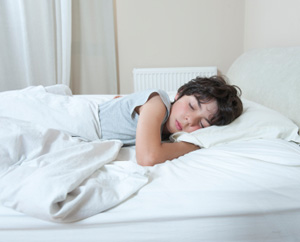Search Healthnotes
- By Maureen Williams, ND
Kids with ADHD Need Their Sleep
Common sense tells us that we don’t function at our best when we are tired, and any parent will tell you that lack of sleep can lead to behavior problems in children. For kids with attention deficit-hyperactivity disorder (ADHD), the impact may be even greater. One study showed that even a little lost sleep has a serious impact on the functioning of kids with ADHD.
Even a little lost sleep may have a serious impact on kids with ADHD
Making the connection between sleep and performance
The study, published in the journal, Sleep, included 43 children between 7 and 11 years old. Eleven of the children had been diagnosed with ADHD and 32 had not. None of the children were known to have sleep disorders. Medications being used to treat ADHD were discontinued before the children began the trial.
Sleep duration, sleep quality, and sleepiness were monitored during the two phases of the trial: six days when the children went to bed at their usual hour, and six days when they went to bed one hour later than usual. The children also underwent mental (cognitive) performance testing at the end of each six-day period. These tests are used to evaluate memory, attention, and reaction times, and scores reflect ability to function in ordinary daily life.
Missing sleep takes a toll
The following are the findings from the study:
- Sleep duration was reduced by an average of 40 minutes during the sleep restriction phase of the trial.
- Sleep quality diminished and sleepiness increased for all of the children with sleep restriction.
- Children with ADHD had poorer baseline scores on cognitive tests than children without ADHD.
- Cognitive test scores deteriorated in both ADHD and non-ADHD kids, but because their baseline scores were worse, most of the sleep-restricted scores in the kids with ADHD exceeded the cutoff score that is associated with behavior changes and inability to perform ordinary daily tasks.
“The present study indicates that sleep deprivation does have a significant negative impact on neurobehavioral functioning in children with ADHD even in the absence of breathing problems such as sleep apnea or sleep disordered breathing,” the study’s authors commented. “This finding is important because sleep problems are common in children with ADHD.”
Helping your children to sleep
This study showed that even modest sleep loss can have real consequences for children with ADHD. Here are some tips for helping children get better sleep:
- Stick to a regular bedtime.
- If dinner is late, keep it light. Eating a big meal just before bed can make it hard to fall asleep.
- Make sure your child has plenty of physical activity and time outside during the day.
- Develop a relaxing bedtime routine. This may include reading your child a story or giving them a warm bath.
- Try turning off computers and television an hour or more before bedtime. Screen time close to bedtime can interfere with sleep quality.
- Experiment with turning off all wireless devices in your house before bedtime. Some children appear to be especially sensitive to the type of radiation emitted by routers, laptops, and other wireless devices.
- Talk to your doctor if your child takes medications regularly and has sleep difficulties. Certain medications, including some decongestants, asthma medicines, and stimulants used to treat ADHD, can contribute to sleep problems.
(Sleep 2011;34:315–23)












